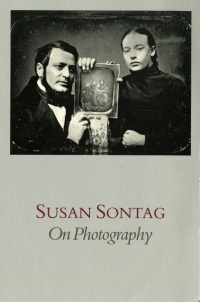Susan Sontag
Susan Sontag (January 16, 1933 – December 28, 2004) was an American writer and filmmaker, professor, literary icon, and political activist.
Life an work
Beginning with the publication of her 1964 essay Notes on 'Camp' , Sontag became an international cultural and intellectual celebrity. Sontag was active in writing and speaking about, or travelling to, areas of conflict, including during the Vietnam War and the Siege of Sarajevo. She wrote extensively about photography, culture and media, AIDS and illness, human rights, and communism and leftist ideology. Her often provocative essays and speeches sometimes drew criticism. The New York Review of Books called her "one of the most influential critics of her generation" [1].
"The photographer," Sontag writes in On Photography, "now charging real beasts, beleaguered and too rare to kill. Guns have metamorphosed into cameras in this earnest comedy, the ecological safari, because nature has ceased to be what it always had been - what people needed protection from. Now nature - tamed, endangered, mortal - needs to be protected from people. When we are afraid we shoot. But when we are nostalgic, we take pictures." (1977: 15).
Literature

- Monographs
- On Photography, 1977
- Sobre la fotografía (Spanish, trans. Carlos Gardini), 1981
- Illness as Metaphor, 1978
- AIDS and Its Metaphors (a continuation of Illness as Metaphor), 1988
- Regarding the Pain of Others, 2003
- Novels
- Death Kit, 1967
- The Volcano Lover, 1992
- In America, 2000
- Essay collections
- "Notes on camp", Camp: queer aesthetics and the performing subject: a reader, (1964): 53-65.
- Against Interpretation (includes "Notes on camp"), 1966
- Styles of Radical Will, 1969
- with Peter Hujar, Portraits in life and death, Da Capo Press, 1976
- Under the Sign of Saturn, 1980
- Where the Stress Falls, 2001
- Regarding the Pain of Others, 2002
- At the Same Time: Essays & Speeches, 2007
- A Susan Sontag Reader, ed. Elizabeth Hardwick, London, 1983
- Articles, papers, chapters, reviews
- "Film and Theatre", The Tulane Drama Review, Vol. 11, No. 1 (Autumn, 1966):24-37
- "A Note on Bunraku", The Threepenny Review, 16 (1984): 16-16
- "In Conclusion...", chap. in East-West Film Journal, Vol. 2, no. 1, December 1987:93-106.
- "Why are we in Kosovo?", New York Times Magazine, May 02, 1999
- "A Photograph is not an Opinion. Or is it?", Women, 1999
- "Looking at War", The New Yorker, 9 Dec. 2002:82-98
- "Regarding the torture of others", New York Times, May 23, 2004:24
- "At the same time... (the novelist and moral reasoning)", English Studies in Africa, 48:1, 2005:5-17
- "An argument about beauty", Dædalus, (Fall 2005):208-2013
- Articles, papers, interviews and reviews on Sontag
- Toback, James, "Whatever You'd like Susan Sontag to think, She doesn't", Esquire magazine, no. 70 (1968):58-61.
- Sohnya Sayres, "Susan Sontag and the Practice of Modernism", American Literary History, Vol. 1, No. 3. (Autumn, 1989):593-611
- Steven Drukman, "Notes on Fornes (with apologies to Susan Sontag)", American Theatre, 17.7 (2000):36
- Evans Chan, "Against Postmodernism, etcetera--A Conversation with Susan Sontag", Postmodern Culture, 2001
- Barbara Clow, "Who's Afraid of Susan Sontag? or, the Myths and Metaphors of Cancer Reconsidered", Social History of Medicine, Vol. 14, no. 2, 2001:293-312
- Jack Coulehan, "Metaphor and medicine: narrative in clinical practice", The Yale journal of biology and medicine, 76 (2003):87-95
- "Art and Conssciousness" (Susan Sontag interviewed by Bonnie Marranca and Gautam Dasgupta), Performing Arts Journal", 80 (2005):1–9
- Chad MCCRACKEN, book reviews (Lopate, Phillip, Notes on Sontag. Princeton University Press, 2009; Sontag, Susan. Reborn: Journals and Notebooks 1947–1963, Edited by David Rieff. New York: Farrar, Straus and Giroux, 2008), The Journal of Aesthetics and Art Criticism, 68:2 Spring 2010:175-197.
- Clive Joinson, "On Photography by Susan Sontag" (book review), The ArtBook, vol. 17, no. 1, february 2010:70
- Bibliography
- Leland A. Poague, Kathy A. Parsons, Susan Sontag. An Annotated Bibliography, 1948-1992, Modern Critics and Critical Studies, vol. 22, Garland Reference Library of the Humanities, Vol. 1065, 2000
- Chris Murray (ed.), Key Writers on Art: The Twentieth Century, Publisher Routledge, ISBN 041522201X, 9780415222013, 2002